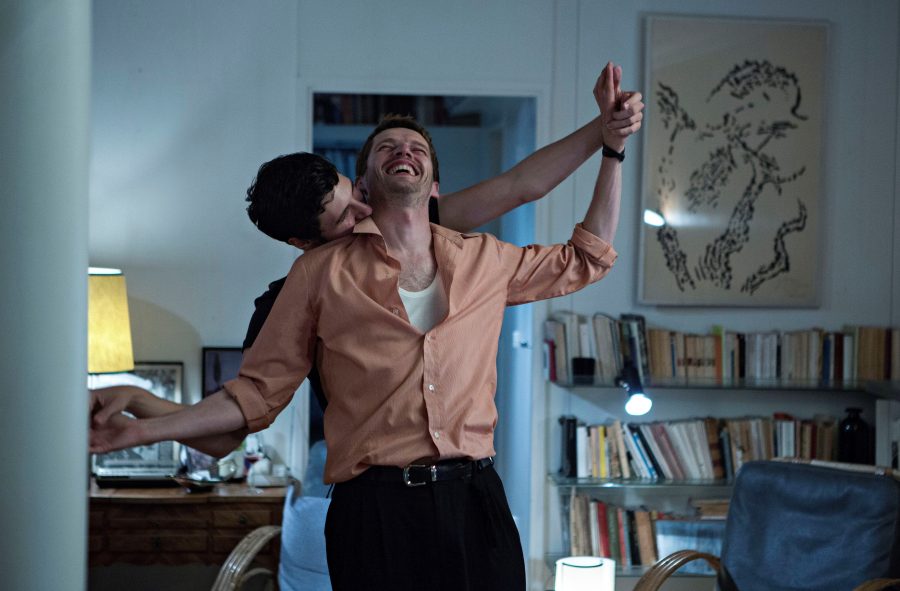A young man from the Brittany region of France, Arthur (Vincent Lacoste), and a 40-something-year-old writer, Jacques (Pierre Deladonchamps), meet by chance in a cinema, sneaking guilty glances at each other from across the aisle. Jacques chuckles softly and playfully tells Arthur to watch the movie. Yet, as Arthur turns away, Jacques moves to sit next to him. He asks Arthur if he likes the movie. Arthur, armed and ready, says he was considering leaving before he saw Jacques. “Life is more surprising than films,” he quips, “especially this one.”
Looking past the meta — which film is Arthur referring to? — and foreboding nature of this meet-cute, it’s important to mention how visually stunning the whole affair is. You could pause any scene in “Sorry Angel” and come away with a poster-worthy shot. Unlike “Call Me by Your Name,” colors aren’t limited to pale, muted tones with hints of summer peach. Every scene in “Sorry Angel” has a unique color palette that miraculously manages to remain cohesive with the film as a whole. For instance, cinematographer Rémy Chevrin coats the cinema in dark shades of indigo, with the only remnants of light reflecting off of Arthur’s and Jacques’ faces to the beat of the movie playing in front of them. The camera closes in on the couple and stays there, holding its gaze as if to show a portrait of budding love, an unlikely couple on their first movie date. And as you sit down to watch “Sorry Angel” and see Arthur and Jacques watching you watching them, you begin to understand the implications of the aforementioned meet-cute. This is not just a storybook film about the ill-fated romance of Arthur and Jacques; it’s a film that explores real struggles that are too often left out of queer film.
I’m referring to the misrepresentation of HIV/AIDS in queer cinema. Despite being set in the early 1980s, “Call Me by Your Name” leaves out any mention of the illness and instead focuses on sexual discovery. “Dallas Buyers Club” focuses on a straight, homophobic man who suffers drastic weight loss due to the disease, but conveniently leaves out mention of other severe symptoms. This is not to say that they’re wrong to leave out the more horrific parts of queer history, but that “Sorry Angel” should be applauded for embracing them.
Arthur and Jacques’ relationship progresses quickly — the two calling and writing love letters to each other constantly. Arthur, ever the literature student, indulges Jacques in his long, existential speeches and admissions of devotion. Jacques, in turn, attempts to remain cool and collected when he hears Arthur is seeing other people. All the while, Jacques attempts to nurse his ex-boyfriend back from the brink of death, but his condition only seems to get worse. With one budding romance on the rise, his past one begins to wither and eventually dies. And of course, we all know what comes next: Jacques is diagnosed with the same disease.
Arthur continues to see him, making the trip from Brittany to Paris several times, but Jacques’s condition doesn’t deteriorate quietly. First, his vision falters, then his legs. He develops lesions all over his chest and face and he can’t control his bowels. He can hardly stand, much less be intimate. But Arthur takes his time and handles Jacques with care, never for a minute dismissing him because of his worsening symptoms. And yet, behind all this unconditional devotion, we see Arthur’s sacrifice perfectly captured in Vincent Lacoste’s performance. In continuing his intimate relationship with Jacques, Arthur takes on the same risk that Jacques took with his ex-boyfriend, and we can only assume that the domino effect continues from there.
There is nothing pretty about HIV/AIDS. And yet “Sorry Angel” is so arresting that even as I write this, I’m still grappling with the moral implications of conflating beauty with tragedy. How can I even begin to claim that a movie depicting a realistic progression of HIV/AIDS is beautiful, gorgeous even, without being somehow insensitive to the survivors and victims of the virus itself? I almost wish that “Sorry Angel” was less haunting so that I could at least say it was a tasteless portrait of a serious issue. But, unfortunately, it’s not that simple. Even in its darkest moments, the film can’t help but be beautiful. And, God forgive me, I wouldn’t want it any other way.
A version of this article appears in the Tuesday, Feb. 19, 2019, print edition. Email Claire Fishman at [email protected].


























































































































































